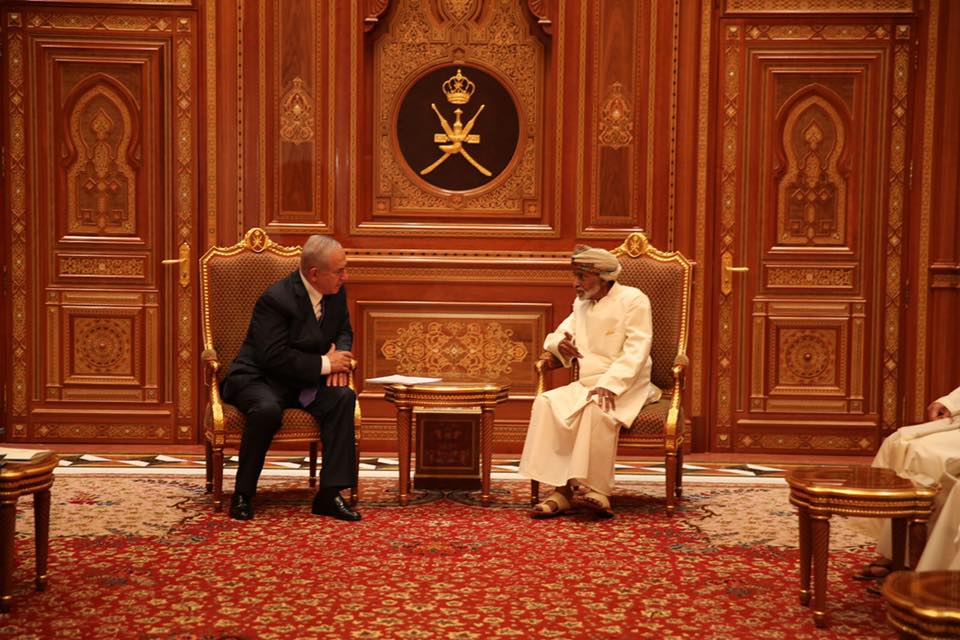Netanyahu Pays Surprise Visit to Oman

Israeli Prime Minister Binyamin Netanyahu’s office said Friday that he has returned from a visit to the Gulf state of Oman, where he joined the country’s leader in the first meeting of its kind in more than 20 years.
The statement said that Netanyahu had been invited by Oman’s Sultan Qaboos bin Said after lengthy communications. Oman state TV carried images of the two leaders meeting and Netanyahu shared a video of his visit on his official social-media accounts, calling it “a special visit to Oman — making history!”
Israel and Oman do not have diplomatic relations. Israel is only officially recognized by two Arab states — Egypt and Jordan.
The meeting was the first between leaders of the two countries since 1996. Former Israeli premier Yitzchak Rabin made a similar surprise visit to Oman two years earlier.
The sultanate has long had a low-key role in fostering negotiations between the Israelis and Palestinians and has openly called for the need for a Palestinian state while also acknowledging a need for an Israeli state.
Palestinian President Mahmoud Abbas also paid a three-day visit to Oman earlier this week but it wasn’t clear whether the visits were connected.
Arab states, including Oman, remain publicly committed to calls for a Palestinian state with Yerushalayim as its capital. Oman has joined a chorus of Arab countries that have strongly condemned Israel’s killing of Palestinians in Gaza protests that erupted in May and continued Friday.
Although historic, the meeting did not immediately signal a breakthrough in peace efforts because Oman does not have the clout or leverage of nations like Saudi Arabia to strongly advocate for, or push the two sides closer to the negotiating table.
Netanyahu and his wife were joined on the trip by the head of Mossad, his Foreign Ministry director, and other defense officials.
Netanyahu and Sultan Qaboos issued a joint statement saying the two sides “discussed ways to advance the Middle East peace process and discussed a number of issues of mutual interest to achieve peace and stability in the Middle East.”
Oman, which sits on the southeastern tip of the Arabian Peninsula, with Saudi Arabia to its north and Iran to its east, has a long record of being a quiet broker in the region, opting to stay on the sidelines of the rivalry between the two regional powerhouses. Although it is a member of the Saudi-led six-nation Gulf Cooperation Council, it did not join the kingdom in its boycott of Qatar or the war in Yemen.
Sultan Qaboos has managed to steer his country through choppy regional politics with a policy of non-interference, helping broker the release of Western hostages in Yemen and providing a back door for communications between Washington and Tehran under the Obama administration.
Netanyahu has repeatedly stated in recent years that Israel has developed good relations with several Arab states, despite a lack of official ties.
Alarm over Shiite-led Iran’s extensive reach in the region in places like Syria, Iraq and Lebanon has sparked behind-the-scenes diplomacy between some Arab states and Israel.
In the lead-up to Friday’s surprise visit to Oman, there have been signs that Israel’s behind-the-scenes dialogue with Arab states is becoming more public.
In February, Oman’s foreign minister made a rare visit by an Arab official to Jerusalem’s Al-Aqsa mosque compound and to the West Bank.
The following month, Omani officials joined their Arab counterparts from the United Arab Emirates, Saudi Arabia, Qatar and Bahrain at the White House for a meeting with Israeli national security officials to discuss the humanitarian situation in the Gaza Strip.
Bahrain, which has a small Jewish community, has also had some unusual outreach with Israel. An interfaith group from the tiny island nation visited Israel in December.
To Read The Full Story
Are you already a subscriber?
Click "Sign In" to log in!

Become a Web Subscriber
Click “Subscribe” below to begin the process of becoming a new subscriber.

Become a Print + Web Subscriber
Click “Subscribe” below to begin the process of becoming a new subscriber.

Renew Print + Web Subscription
Click “Renew Subscription” below to begin the process of renewing your subscription.












